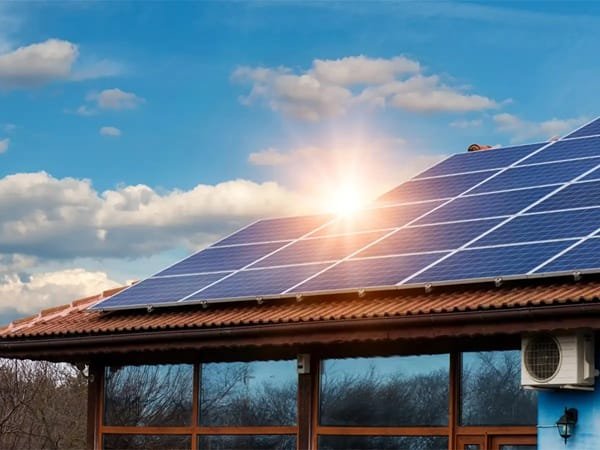As electric vehicles become increasingly common, homeowners are seeking convenient and cost-effective ways to keep them charged—and for many, the solution is already on their roof. Rooftop solar panels, paired with smart energy systems, allow EV owners to power their vehicles at home using clean, renewable energy. Freedom Forever Solar reviews consistently highlight the company’s ability to deliver tailored solar solutions, including seamless EV charging integration that makes transportation more efficient, sustainable, and affordable.
This setup delivers more than just savings at the gas pump. It promotes long-term energy independence, stabilizes household electricity expenses, and supports environmentally conscious mobility choices. As EV charging technology continues to advance, solar energy is emerging as the preferred companion for drivers who value both efficiency and sustainability.
Why Rooftop Solar and EVs Work Together
Charging an electric vehicle at home increases household electricity use, sometimes significantly. Without solar, that additional load is supplied entirely by the local utility grid, which can lead to higher bills, especially during peak hours.
Rooftop solar offsets this cost by generating clean electricity on-site. When designed to meet both household energy needs and vehicle charging demand, a solar system helps reduce reliance on grid power and smooth out daily electricity consumption.
This strategy works best when the EV is charged during daylight hours, when solar panels are most productive, or when a battery system stores daytime energy for use at night.
How Charging Works with a Home Solar Setup
In a typical home setup, rooftop solar panels generate Direct Current (DC) electricity, which is then converted into Alternating Current (AC) by an inverter. That AC electricity powers the home, including any connected EV chargers.
Most homeowners install a Level 2 charger, which delivers 240 volts and significantly faster charging than a standard wall outlet. However, the choice between Level 1 and Level 2 chargers depends on individual driving habits, vehicle specifications, and budget. Level 1 chargers, which use standard 120-volt outlets, may be sufficient for those with shorter daily commutes or lower charging needs.
When designing a solar system, homeowners assess current and future charging needs. It ensures that panels, inverters and wiring can support EV charging now and as energy use grows.
Scheduling Charging for Maximum Efficiency
Smart charging tools let homeowners schedule when their EV draws power. It becomes especially valuable when combined with solar generation patterns. For example, the charger can be set to begin charging during mid-morning and early afternoon hours when solar output is high.
Some platforms go a step further, using AI to forecast weather, energy use, and electricity pricing to determine the most efficient charging schedule. These tools help balance home energy use and make sure EVs are charged when they cost the least and use the cleanest energy source.
By charging from rooftop solar during peak production hours, homeowners can avoid high time-of-use utility rates while reducing their carbon footprint.
Storage Adds Flexibility
Adding battery storage to a solar system provides more control over when and how EVs are charged. Instead of relying solely on real-time sunlight, a battery stores excess solar power during the day and makes it available at night or during periods of low production.
This is especially helpful for households that return in the evening and need to charge overnight. The car can still be charged with solar power, just from stored energy instead of direct sunlight.
Battery storage also serves as a backup power source during outages, ensuring that critical appliances and even vehicles remain usable in emergencies.
Cost Savings and Incentives
Charging with solar energy can lead to long-term savings by reducing the amount of electricity purchased from the grid. Over time, these savings help offset the cost of both the solar system and the EV charger itself.
Incentives are available to support these upgrades. The federal Solar Investment Tax Credit (ITC) provides a significant rebate for eligible solar installations, and many state programs offer additional support for EV charger installation.
Combining solar and EV-related incentives can significantly lower upfront costs and improve the return on investment for households looking to make the transition to clean energy and electric mobility.
Design Considerations for Rooftop Charging Systems
When planning to charge an EV with rooftop solar, it’s important to size the system correctly. Factors to consider include:
- Daily driving habits: How many miles are driven per day, and the car’s energy consumption per mile
- Home energy use: Current and expected household electricity needs
- Sunlight exposure: Average solar production based on roof angle, location and shading
- Charger type: The power level of the installed EV charger and associated electrical load
Freedom Forever reviews key factors like daily driving habits, home energy use and charger type during the system design process, creating customized setups that meet both household and EV energy requirements.
Sustainability and Lifestyle Benefits
Charging an EV with solar not only reduces energy costs but also supports broader environmental goals. Grid electricity is often produced with fossil fuels, so even EVs can indirectly contribute to emissions when charged without renewable energy.
By using rooftop solar, homeowners eliminate that middle step, ensuring their vehicle is powered by clean energy from start to finish. This full-circle approach to sustainability resonates with eco-conscious consumers who want to align their transportation choices with their values.
Beyond environmental benefits, having solar at home provides the flexibility and reliability that public charging infrastructure may not always offer. Homeowners can charge electric vehicles on their schedule without depending on the availability of public transportation. This convenience is especially valuable during peak travel times or emergencies. It also reduces long-term charging costs and supports greater energy independence.
A Smarter Way to Power Your Commute
As electric vehicles become more affordable and solar technology continues to improve, the link between home energy and transportation is getting stronger. Rooftop solar makes it easier and smarter to power your EV with the clean energy you control.
With the right system in place, charging your vehicle becomes a seamless part of your home’s daily energy flow. This practical solution helps homeowners reduce their reliance on fossil fuels, lower their utility costs, and increase their energy independence.
Homeowners realize these benefits through custom-designed solar systems that support modern energy needs at home and on the go.



